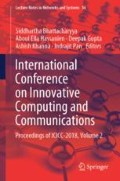Abstract
As a software system evolves, the changes are introduced at every stage of its development. The timely identification of change prone classes is very important to reduce the costs associated with the maintenance phase. Thus, the author has developed various models which can be used in the design phase (one of the early phases) to identify the parts of software which are more change prone than others. Software metrics along with the change data can be used for developing the models. In this study, the author has investigated the performance of various ensemble learners and a statistical model for identifying the classes which are change prone. The use of ensemble learners gives the researchers an opportunity to analyze and investigate them in the area of change prediction. The empirical validation is carried on five official releases of Android operating system. The overall results of the study indicate that the ensemble learners are capable of effective prediction.
Access this chapter
Tax calculation will be finalised at checkout
Purchases are for personal use only
References
Zhou ZH (2012) Ensemble methods: foundations and algorithms. Chapman and Hall/CRC
Schapire RE (1990) The strength of weak learnability. Mach Learn 5(2):197–227
Dietterich T (2000) Ensemble methods in machine learning. In: Multiple classifier systems, pp 1–15
Nagi S, Bhattacharyya D (2013) Classification of microarray cancer data using ensemble approach. Netw Modeling Anal Health Inf Bioinform 2(3):159–173
Chen T (2014) A selective ensemble classification method on microarray data. J Chem Pharm Res 6(6):2860–2866
Dittman DJ, Khoshgoftaar TM, Napolitano A, Fazelpour A (2014) Select-bagging: effectively combining gene selection and bagging for balanced bioinformatics data. In: IEEE international conference on bioinformatics and bioengineering, pp 413–419
Chidamber SR, Kemerer CF (1994) A metrics suite for object-oriented design. IEEE Trans Softw Eng 20:476–493
Malhotra R, Bansal A, Jajoria S (2016) An automated tool for generating change report from open-source software. In: IEEE international conference on advances in computing, communications and informatics, pp 1576–1582
Hosmer D, Lemeshow S (1989) Applied logistic regression. Wiley, New York
Stone M (1974) Cross-validatory choice and assessment of statistical predictions. J R Soc Ser A 36:111–114
Author information
Authors and Affiliations
Corresponding author
Editor information
Editors and Affiliations
Rights and permissions
Copyright information
© 2019 Springer Nature Singapore Pte Ltd.
About this paper
Cite this paper
Bansal, A. (2019). Analysis of Ensemble Learners for Change Prediction in an Open Source Software. In: Bhattacharyya, S., Hassanien, A., Gupta, D., Khanna, A., Pan, I. (eds) International Conference on Innovative Computing and Communications. Lecture Notes in Networks and Systems, vol 56. Springer, Singapore. https://doi.org/10.1007/978-981-13-2354-6_34
Download citation
DOI: https://doi.org/10.1007/978-981-13-2354-6_34
Published:
Publisher Name: Springer, Singapore
Print ISBN: 978-981-13-2353-9
Online ISBN: 978-981-13-2354-6
eBook Packages: Intelligent Technologies and RoboticsIntelligent Technologies and Robotics (R0)

